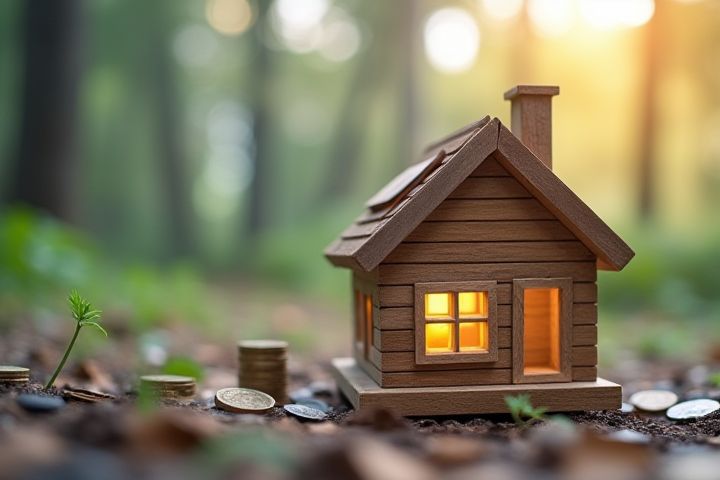
Investing in a house offers the potential for long-term financial growth as property values typically appreciate over time. Owning real estate can provide you with a steady source of income through rental opportunities, which can significantly enhance your cash flow. A home also allows you to build equity, which can be leveraged for future financial needs such as college tuition or debt consolidation. Tax benefits, including mortgage interest deductions and property tax deductions, can reduce your overall tax burden. Furthermore, a house can serve as a stable living environment, offering security and a sense of community that renting may not provide.
Why Invest In A House
Building Equity
Investing in a house allows you to build equity, which is the difference between your property's market value and the outstanding mortgage balance. As you make mortgage payments, your equity increases, ultimately providing a valuable asset that can improve your financial stability. Over time, home values typically appreciate, with a historical average annual increase of about 3-5%, further boosting your equity. By owning a home, you not only enjoy potential tax benefits, but you also create a long-term investment that can be leveraged for future financial needs or retirement plans.
Potential Tax Benefits
Investing in a house can provide substantial tax benefits that can enhance your overall financial strategy. Homeowners may deduct mortgage interest, which can save you thousands annually, particularly during the early years of your loan when interest payments are highest. Property tax payments are also typically deductible, providing further opportunities for tax savings that can improve your cash flow. By utilizing these deductions effectively, you can significantly reduce your taxable income, allowing you to allocate resources towards other investment opportunities or personal expenses.
Hedge Against Inflation
Investing in a house serves as a robust hedge against inflation, as property values typically increase over time. For instance, historical data reveals that home prices have risen by approximately 3-4% annually, often outpacing inflation rates. Owning a home allows you to lock in mortgage payments, which remain fixed while rental prices and living costs inflate. By investing in real estate, you not only secure a valuable asset but also protect your wealth from the eroding effects of inflation.
Sense of Stability
Investing in a house provides a sense of stability, as homeownership often leads to long-term financial security. Unlike renting, where monthly payments contribute to a landlord's equity, your mortgage payments build ownership, potentially increasing your net worth over time. Moreover, the average homeowner experiences a property value appreciation of about 3-5% annually, contributing to lasting financial assets. Owning a home also fosters community ties and enhances personal well-being, leading to an overall improved quality of life.
Potential for Rental Income
Investing in a house can yield substantial rental income, often averaging between 8% to 12% annual return on investment. Many urban markets experience a demand surge, with rental prices increasing by as much as 5% annually, ensuring a steady income stream. Additionally, properties in desirable locations may appreciate significantly, often by 3% to 5% per year, enhancing your overall investment portfolio. By purchasing a property that can be rented out, you can create a reliable source of passive income that supports financial independence.
Opportunity for Customization
Investing in a house offers a unique opportunity for customization, allowing you to tailor every aspect to your personal preferences. With 70% of homeowners expressing satisfaction with renovations, transforming your space into a reflection of your style can greatly enhance your living experience. By customizing features such as layout, color schemes, and fixtures, you create a home that fits your lifestyle and needs. This personalization not only increases your enjoyment but can also significantly boost your property's market value, with well-executed renovations offering returns of 70% to 100% upon resale.
Long-Term Investment Appreciation
Investing in a house typically offers long-term investment appreciation, with historical data indicating an average annual increase of about 3-5% in home values. This appreciation can lead to significant equity buildup over time, allowing you to leverage this asset for future opportunities. Real estate often acts as a hedge against inflation, preserving your purchasing power as property values and rental prices tend to rise with inflation rates. By choosing to invest in a home, you secure a tangible asset that not only provides shelter but also the potential for wealth accumulation and financial stability.
Community Connection
Investing in a house fosters strong community connections, enhancing your living experience and overall quality of life. When you own a home, you become part of a neighborhood, allowing you to build relationships with neighbors and participate in local events and activities. This sense of belonging can lead to support networks that improve mental well-being and provide social interactions. A connected community often results in increased property values, making your investment not just a home but also a financially sound decision.
Forced Savings
Investing in a house serves as a form of forced savings, where your mortgage payments contribute to building equity over time. For instance, with a 30-year fixed-rate mortgage, you consistently pay down principal, which increases your ownership stake in the property. Historically, real estate appreciates, with the average yearly increase around 3-5%, providing potential long-term returns on your investment. By dedicating funds to homeownership, you create a structured way to save, making it easier to accumulate wealth compared to traditional saving methods.
Legacy and Inheritance Value
Investing in a house creates a tangible legacy that can be passed down through generations, often ensuring financial stability for your heirs. Real estate typically appreciates over time, with historical average growth rates around 3-5% annually, offering potential for significant inheritance value. Owning a home also allows you to shape family memories and traditions, enriching emotional ties to the property that enhance its sentimental worth. As you build equity, the house can serve as a financial foundation for your family, providing a valuable asset that may support their future endeavors.
